With 40 amp electric car chargers, you can charge your vehicle quickly. They’re powered by 240 volts and will give an average of 9.6 kW per charger which makes it easy for drivers who have been waiting in line at the gas station.
In this review we will look over several kinds:
The best way to charge an electric car is with home chargers. There are several different types of batteries for electric cars, so you’ll be able to choose the one that’s perfect for you. You can discover how long it will take at 40 amps for a 75 kW battery capacity, which might be 5 hours.
The charger is an essential part of owning a car that has been built in recent years. There are many different types1 and they all serve their own purpose well, but it can be difficult to know which one you need or want if there isn’t much information available on the subject matter at hand!
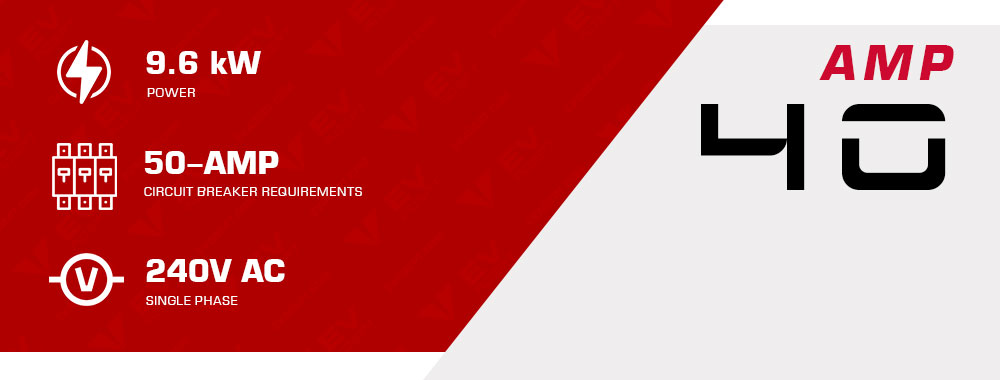
NEMA 14-50 plug-in chargers
NEMA 14-50 sockets are used in residential properties to connect appliances that have maximum amps of 402. This means it can hold up any device under the influence, which makes this type ideal for your home!
- Get a great dealFeb 24, 2026 4:15 PM
These products are often purchased with:
- ChargePoint Home Flex 16 to 50 Amp, 240V, NEMA 14-50, 23ft cable
- JuiceBox 40 amp EVSE, 25-Foot Cable, NEMA 14-50 Plug
NEMA 6-50 plug-in models
What are you looking for in a charger? A lot of people might say that they need one with NEMA 6-50 power outlets and it’s true! This article will show the best models available on today’s market.
Our customers also like it:
- Morec EV Charger Level 2 32 Amp Upgraded Portable Electric Vehicle Charger, NEMA 6-50 220V-240V 26ft (7.9M)
- MUSTART Level 2 Portable EV Charger (240 Volt, 25ft Cable, 40 Amp), Electric Vehicle Charger Plug-in EV Charging Station with NEMA 6-50P
- ClipperCreek HCS-50P Plug-in, 40A, L2 EVSE, 240V, NEMA 6-50
Portable and travel EV Chargers
We all know that every inch of space in your car is valuable. The last thing you want are bulky chargers taking up precious room- which means it’s time for something small and sleek! These top models will fit right into any trunk with ease, so there won’t be anything blocking or hiding them from view when driving around town (or running errands).
We also like:
Hardwired chargers
Hardwired appliances have a higher installation cost because they need to be installed by an expert in electrical engineering.
- Best seller for 40A and upJuiceBox 40 Hardwired Smart EV Home Charging Station (40 Amp, 240 Volt, 25ft Cable), WiFi, Indoor/Outdoor charger, Energy Star & UL CertifiedGet a great dealFeb 24, 2026 4:15 PM
- Get a great dealFeb 24, 2026 4:15 PM
Shoppers also choose:
Level 2 is better because it can charge more quickly. The 9.6 kW unit can add about 4 miles of range in just ten minutes, while a 1.4 kW model would take 1 mile. You won’t regret choosing a 40 Amp EV charger instead of the Level-1 device.
How long does it take to charge an electric vehicle at a 40 Amp charging station?
| Volkswagen ID.4 | 36 mi/h |
| KIA Niro EV | 22 mi/h |
| Nissan Leaf | 23 mi/h |
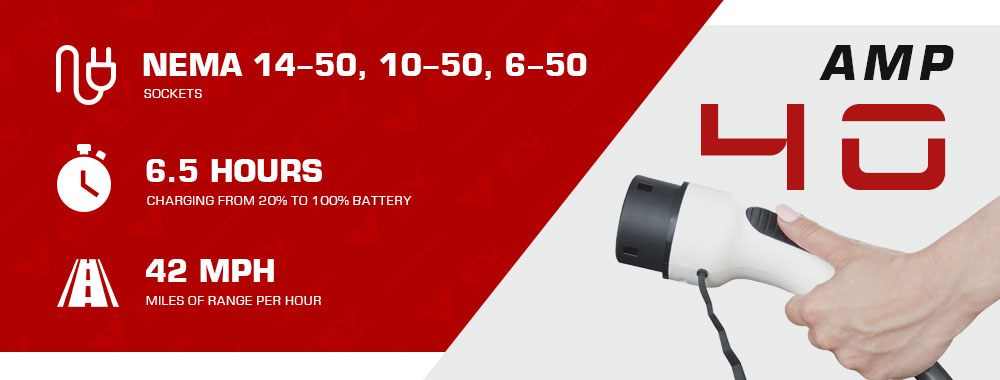
Comparison table for NEMA 14-50 plug-in chargers
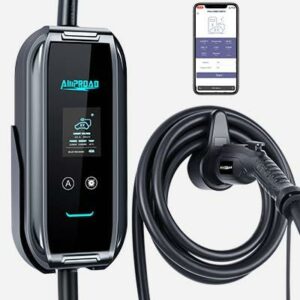 | 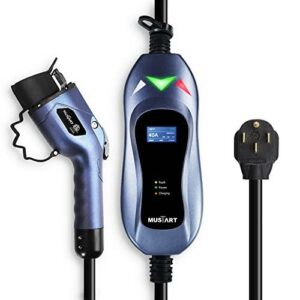 | 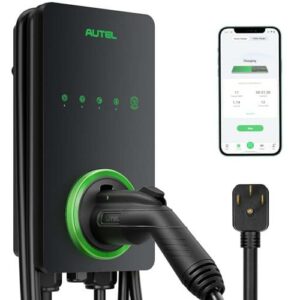 | 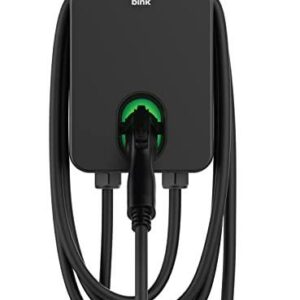 | 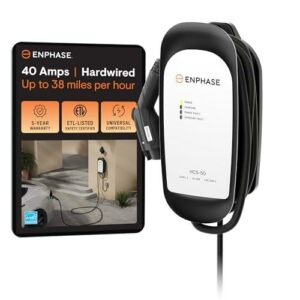 | |
| AMPROAD iFlow P9 Level 2 Portable Electric Vehicle (EV) Cha... | MUSTART Level 2 Portable Electric Vehicle (EV) Charger (240... | Autel MaxiCharger Level 2 Electric Vehicle (EV) Charging St... | Blink Charging Blink HQ 200 40 Amp, Level 2 Electric Vehicl... | ClipperCreek Level 2 Hardwired Electric Vehicle (EV) Home C... | |
| Brand | AMPROAD | MUSTART | Autel | Blink Charging | ClipperCreek |
| Amperage | 10, 16, 24, 32, 40 | 40 | 40 | 40 | 40 |
| Voltage | 110, 240 | 240 | 240 | 240 | 240 |
| Cable length, ft | 25 | 25 | 25 | 23 | 25 |
| Enclosure Material | n/a | ||||
| Socket | NEMA 14-50 | NEMA 14-50 | NEMA 14-50 | NEMA 14-50 | NEMA 14-50 |
| Travel/Portable | Yes | Yes | No | ||
| Wall/Stand | Wall | Wall | |||
| Waterproof | IP65 | Yes | 1 | ||
| Weight | 16.46 | 14.01 | 26.2 | 19.34 | 14 |
| Working temperature | -13°F~122°F | n/a | -22°F to 122°F | ||
| Warranty | 2 years | 3 years | 1 year | 3 years | |
| Certificate | n/a | CSA certified and conformity to UL 2594, UL 2231-1 and UL 2231-2 | UL listing and Energy Star Certification | ENERGY STAR, ETL and cETL | |
| Wi-Fi | Yes | No | Yes |
How can you compare EVSEs to choose the best one?
If you’re thinking about buying an EV charger, there are a few things you’ll want to keep in mind. Here are some of the most important criteria to consider:
- Brand: There are a number of different brands of EV chargers on the market, so it’s important to do your research and find one that you trust.
- Amperage: This is the amount of current that the charger can provide. It’s important to choose one with an amperage that’s appropriate for your vehicle.
- Voltage: This is the amount of electricity that the charger provides. Make sure you choose one with a voltage that’s compatible with your home’s electrical system.
- Cable length, ft: Chargers come with different-length cables, so you’ll want to make sure you choose one that’s long enough to reach your car.
- Socket: Chargers plug into a standard electrical socket, so make sure you have one that’s compatible with your charger.
- Waterproof: If you live in a rainy climate, you’ll want to choose a charger that’s waterproof.
- Weight: Chargers come in different weights, so you’ll want to choose one that’s easy to move around.
- Working temperature: Chargers have different working temperatures, so you’ll want to make sure you choose one that’s compatible with the climate you live in.
- Warranty: Many chargers come with a warranty, so be sure to check before you buy.
- Certificate: Some chargers come with a certificate from an independent testing laboratory. This can give you peace of mind that the charger is safe and reliable.
Comparison table for NEMA 6-50 plug-in chargers
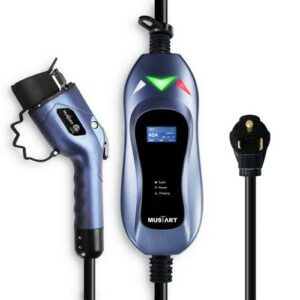 | 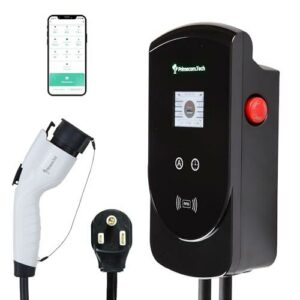 | 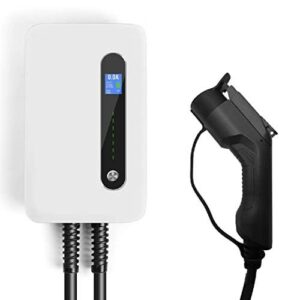 | 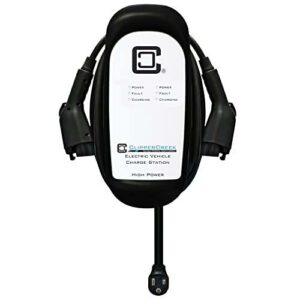 | 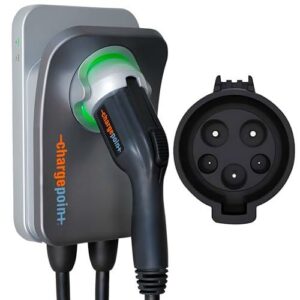 | |
| MUSTART Level 2 Portable EV Charger 9.6 kW (240Volt, 25ft/7... | PRIMECOM Level 2 EV Charging station 9.6 kW (240 Volt, 30ft... | Lectron Level 2 EV Charging station 9.6 kW (240Volt, 20ft/6... | ClipperCreek Level 2 Dual Home Charging Station (HCS-D50) N... | ChargePoint NEMA 6-50 plug Home Charging Station Level 2 (2... | |
| Overview | Handy device plugs into NEMA 6-50 socket and distributes power between two cars. | Charge Smarter, Not Just Faster. Safe and Reliable for Your Home and Your EV. Works with Any EV. Can be hardwired. | |||
| Brand | MUSTART | PRIMECOM | Lectron | ClipperCreek | chargepoint |
| Cable length, ft | 25 | 30 | 20 | 25 | 23 |
| Travel/Portable | Yes | Yes | No | No | No |
| Wall/Stand | Wall | Wall | Wall | Wall | |
| Waterproof | IP65 | IP56 | IP66 | Yes | Yes |
| Weight | 8.16 | 16.02 | 14.32 | 21 | 17.6 |
| Working temperature | n/a | n/a | n/a | -22°F to 122°F | -40°F to 122°F |
| Warranty | 1 year | 1 year | n/a | n/a | 3 years |
| Certificate | n/a | CE️ | n/a | ETL, cETL, ENERGY STAR | UL certificate 20190607-E328478 issued 06/07/2019; Type 3R per UL 50E; ENERGY STAR qualified 06/25/19. |
| Wi-Fi | No | No | No | No | Yes |
Portable EV chargers offer a number of advantages over traditional EV charging stations. First and foremost, they are much more travel-friendly and can be easily taken with you on the go. This means that you’ll never have to worry about finding a charging station when you’re out and about – simply bring your portable charger with you wherever you go. Additionally, portable chargers are generally much smaller in size than charging stations, making them more convenient and easier to store.
Comparison table for portable and travel EV chargers
 |  | 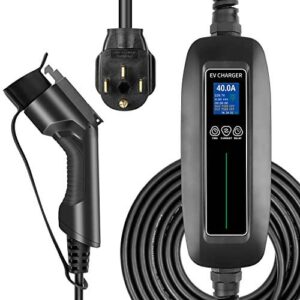 | 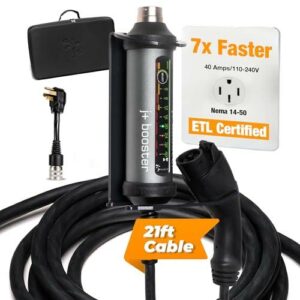 |  | |
| MUSTART Level 2 Portable Electric Vehicle (EV) Charger (240... | Blink Charging Blink HQ 200 40 Amp, Level 2 Electric Vehicl... | Elecvlife Level 2 Portable EV Charger 9.6 kW (240Volt, 25ft... | J + Booster 40 Amp, Level 2 Portable Electric Vehicle (EV) C... | Morec 40 Amp, Level 2 Portable Electric Vehicle (EV) Charge... | |
| Brand | MUSTART | Blink Charging | Elecvlife | j+ | Morec |
| Amperage | 40 | 40 | 16, 24, 32, 40 | 12, 16, 20, 24, 32, 40, 6, 8 | 40 |
| Voltage | 240 | 240 | 240 | 240 | 240 |
| Cable length, ft | 25 | 23 | 25 | 21 | 20 |
| Enclosure Material | n/a | ABS + PC alloy | High Strength ABS material | ||
| Socket | NEMA 14-50 | NEMA 14-50 | NEMA 14-50 | NEMA 14-50, NEMA 5-15 | NEMA14-50 |
| Waterproof | Yes | IP65 | IP67 | IP66 | |
| Weight | 14.01 | 19.34 | 10.93 | 7.7 | 8.8 |
| Working temperature | n/a | -22°F to 158°F | -22°F to +122°F | -22 to + 122 °F | |
| Warranty | 2 years | 1 year | n/a | 1 year | |
| Certificate | n/a | UL listing and Energy Star Certification | n/a | Ul certified | CE & FCC |
The main advantage of hardwired EV chargers over portable/plug-in or EV chargers is that they are more error-proof. With a hardwired EV charger, the charging process is verified and completed automatically, whereas with a plug-in EV charger, it is up to the driver to ensure that the charger is properly plugged in and that the charging process is completed correctly.
A plug-in EVSE can often lead to error and miscommunication, particularly when multiple drivers are using the same charger. Hardwired EV chargers eliminate this possibility, making them a more reliable option. Additionally, hardwired EV chargers are typically faster than plug-in EV chargers, making them a better choice for those who need to charge their vehicle quickly.
Comparison chart for hardwired chargers
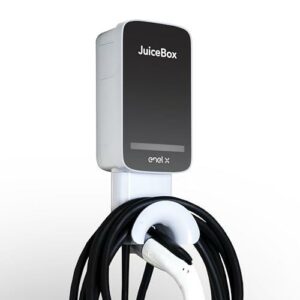 | 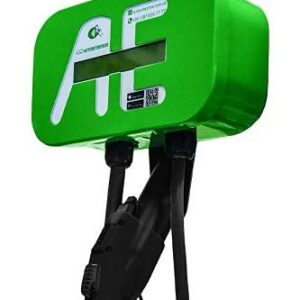 |  | 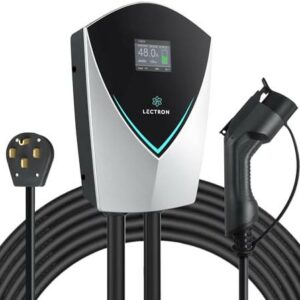 | 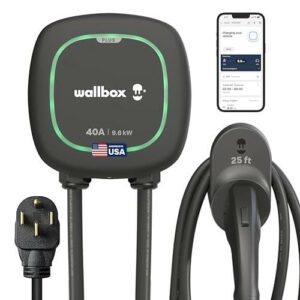 | |
| JuiceBox 40 Hardwired Smart EV Home Charging Station (40 Am... | AUTO ENTERPRISE Level 2 EV Charging station 12 kW (240 Volt... | ClipperCreek Level 2 Hardwired Electric Vehicle (EV) Home C... | Lectron Level 2 Electric Vehicle (EV) Charging Station (240... | Wallbox Pulsar Plus Level 2 EV Charger (240 Volt, 25ft Cabl... | |
| Overview | A hardwired connection that is perfect for those who want to be prepared for an EV future with more power. Professional Installation is required. The app and stable wifi make it easy to keep track of your charging. | EVSE with IP65 protection class, IK10 mechanical protection. Charging speeds of up to 50 amps. | This charger offers two connection options and two maximum power options, making it perfect for EV owners. Hardwired connections are eligible up to 48 amps. | ||
| Enclosure Material | n/a | Steel with anti-corrosion coating | |||
| Weight | 21.2 | 27 | 14 | 19.06 | 19.81 |
| Warranty | 3 years | n/a | 3 years | ||
| Certificate | UL & Energy Star | n/a | ENERGY STAR, ETL and cETL | Energy Star Certified | |
| Wi-Fi | Yes | No | Yes |
Fastest plug-in charger
The popularity of 40-amp chargers is due to the rapid speed. They deliver 9.6 kilowatts of power. A battery can be charged by a charger in 6 hours if it has a 20% discharged, medium-capacity electric car battery. In one hour, a 40-amp charger will add 42 miles of range to an electric car.
The maximum power of all the plugged-in chargers is 40 amps. If you want a more powerful charger, it will directly connect to the electrical panel. A majority of electric cars, however, have a 48-amp limit and cannot accept a higher current.
A 40-amp Level-2 charger is 7 times more efficient than a standard Level-1 charger and connects to 240 volts. With at least 50 amps of breaker power, the 40A units may be connected to NEMA 10-50, 14-50, or 6-50 outlets. Some appliances are hardwired, which means they connect directly to the power grid without the use of a socket.
Contents
- 1 NEMA 14-50 plug-in chargers
- 2 NEMA 6-50 plug-in models
- 3 Portable and travel EV Chargers
- 4 Hardwired chargers
- 5 How long does it take to charge an electric vehicle at a 40 Amp charging station?
- 6 Comparison table for NEMA 14-50 plug-in chargers
- 7 How can you compare EVSEs to choose the best one?
- 8 Comparison table for NEMA 6-50 plug-in chargers
- 9 Comparison table for portable and travel EV chargers
- 10 Comparison chart for hardwired chargers
- 11 Fastest plug-in charger

I remember my dad working on old gasoline engines in our garage. I’m about to take the plunge into the EV world and was wondering about the best 40 Amp chargers? Does the length of the cable make a significant difference?
I’ve had the ChargePoint for about a year now. The 23ft cable is just about right for my setup, reaching my car comfortably. Also, being WiFi-enabled, I can track my charging habits, which is a plus. But honestly, cable length is more about your garage setup than the charger itself.
Having used both the Siemens VersiCharge and the Enel X JuiceBox, I feel the JuiceBox offers a more seamless experience due to its WiFi capabilities. It’s fascinating to see technology play such a role in something as mundane as charging. Anyone else tried multiple chargers?
I agree. Moved from the Blink HQ 200 to the JuiceBox recently. The connectivity features make a world of difference, especially if you’re someone who loves data and insights.
Thinking about the broader implications, as we move towards a more sustainable future, choosing the right EV charger plays a role too. I’m drawn to the ENERGY STAR-rated ChargePoint. Do you all think energy efficiency ratings should play a bigger part in our decisions?
Absolutely! Energy efficiency not only helps reduce the environmental impact but can also be easy on the wallet in the long run. Always good to think about the bigger picture.
I’m on a budget and looking for recommendations. Want to ensure I get value for money but also a reliable product. Thoughts?
Consider the Pulsar Plus. It’s compact, efficient, and offers good value for money. Plus, its 9.6kW power output is pretty decent for its price range.
Had a bit of a hiccup with the Morec ev Charger. It’s great when it works, but I’ve had connection issues a couple of times. Maybe it’s just my luck, but thought I’d share.
Thanks for the heads up. Connectivity is crucial, especially if the charger supports features like remote start/stop and scheduling. I’ll keep that in mind.
Anybody here installed their own charger at home? I’m pondering whether to hire a pro or do it myself. I have decent electrical knowledge, thanks to a summer job in college.
If you’re confident with your skills and aware of the safety guidelines, why not? But remember, peace of mind has its value too. Getting a pro might be a bit more expensive, but they’ll ensure everything’s set up correctly.
Traveling a lot, I’m considering getting a plug-in charger so I can use it in various locations. The flexibility seems ideal. Anyone else lead a similar lifestyle and found plug-in chargers to be beneficial?
I move quite often due to work, and having a plug-in charger has been a lifesaver. Especially the models with longer cables. Gives me a lot of flexibility on where I park and charge.
With EVs gaining traction, I hope manufacturers continue to innovate and improve the charging experience. I mean, WiFi and Bluetooth today; what’s next? Wireless charging pads for homes?
Speaking of chargers, heard there’s a sale on some models next week. Anyone interested in pooling together for a bulk purchase? Might get a bigger discount.
Always ensure your installation is up to code, folks. A friend skimped on the installation, faced issues later. Safety first!